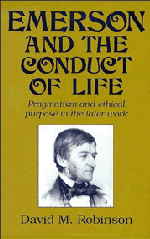Book contents
- Frontmatter
- Contents
- Acknowledgments
- List of Abbreviations
- Introduction
- 1 The Mystic and the Self-made Saint
- 2 Politics and Ecstasy
- 3 The Text of Experience
- 4 “Here or Nowhere”: Essays: Second Series
- 5 The Eclipse of the Hero: Representative Men
- 6 The Old and New Worlds: English Trait
- 7 “Work Is Victory”: The Conduct of Life
- 8 “Plain Living and High Thinking”: Society and Solitude
- 9 Toward a Grammar of the Moral Life
- Notes
- Work Cited
- Index
- Titles in the series
9 - Toward a Grammar of the Moral Life
Published online by Cambridge University Press: 18 December 2009
- Frontmatter
- Contents
- Acknowledgments
- List of Abbreviations
- Introduction
- 1 The Mystic and the Self-made Saint
- 2 Politics and Ecstasy
- 3 The Text of Experience
- 4 “Here or Nowhere”: Essays: Second Series
- 5 The Eclipse of the Hero: Representative Men
- 6 The Old and New Worlds: English Trait
- 7 “Work Is Victory”: The Conduct of Life
- 8 “Plain Living and High Thinking”: Society and Solitude
- 9 Toward a Grammar of the Moral Life
- Notes
- Work Cited
- Index
- Titles in the series
Summary
THE UNIVERSAL CIPHER
“I am of the oldest religion”
(W, 12:16).The assessment of Emerson's later career is complicated by the gradual decline in creative order that he was able to bring to his work after Society and Solitude. The pattern of revision and rearrangement of journal and lecture material into book form that had begun in the 1830s served him well in many respects, but the final process of selection, organization, and revision was always a burden to him, perhaps because it seemed further removed from the original moment of inspiration and lacked the immediacy of a potential living audience. Emerson's personal struggles with authorship were exacerbated in the 1860s by the emotional burdens and material constrictions of the Civil War, and his will and capacity to bring his papers into book form declined precipitously after a fire at his home in 1872. The resulting situation, in which James E. Cabot took charge of editing much of the later work, prompts caution in analyzing these texts, but less for their validity as Emerson's ideas than for the authority of their combination and arrangement. “There is nothing here that he did not write, and he gave his full approval to whatever was done in the way of selection and arrangement,” Cabot explained, adding, as I pointed out in Chapter 8, “but I cannot say that he applied his mind very closely to the matter” (W, 8:xiii).
- Type
- Chapter
- Information
- Emerson and the Conduct of LifePragmatism and Ethical Purpose in the Later Work, pp. 181 - 201Publisher: Cambridge University PressPrint publication year: 1993



